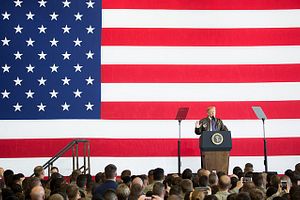With the release of the U.S. National Security Strategy and National Defense Strategy, the Trump administration has foreshadowed a much more confrontational relationship with China. But U.S. allies and friends question how well the Trump administration rhetoric relates to strategic reality.
Net result? So far, advantage China.
The rhetoric is clear. The National Security Strategy describes China as a “revisionist power” that aims “to shape a world antithetical to U.S. values and interests,” “displace the United States in the Indo-Pacific region,” “reorder the region in its favor,” “expand the reaches of its state-driven economic model,” and “steal U.S. intellectual property.”
The National Defense Strategy (NDS) reiterates the “central challenge” to U.S. interests as strategic competition with revisionist powers, with China at the top of the list. According to the NDS, China employs “predatory economics to intimidate its neighbors while militarizing features in the South China Sea” and seeks “Indo-Pacific regional hegemony in the near-term and displacement of the United States to achieve global pre-eminence in the future.”
The documents are also clear about the importance of allies to U.S. strategy: they bring “invaluable advantages,” “magnify our power,” and, as such, the United States will deal with competitors “from a position of strength, foremost by ensuring our military power is second to none and fully integrated with our allies and all of our instruments of power.”
All true and laudable declarations. But U.S. allies and friends don’t seem to be buying it. There are at least four good reasons for their scepticism.
Let’s begin with the fundamental premise of these documents: that China is a “revisionist power” that gravely challenges the longstanding interests of the United States and its allies. There is some truth in that. But at the same time this claim emanates from an administration that in one year has itself unwound and “revised” fundamental elements of the liberal international order: questioning the value of NATO and other American alliances; exiting the Trans-Pacific Partnership (TPP) and reconsidering U.S. commitment to other multilateral and bilateral free trade arrangements; withdrawing from global climate change negotiations; and showing support for authoritarian leaders.
How can U.S. allies and friends join fully in support of U.S. goals to counter revisionist threats when Washington itself taken has taken steps to undermine U.S. partners’ interests in a robust, rules-based, liberal international order, normally underpinned by trustworthy political, economic, and military ties between Washington and allied capitals?
Questions also arise in allies’ minds as to the fiscal sustainability of the strategies, a point U.S. Defense Secretary James Mattis seems to acknowledge. In public remarks launching the NDS, he mentioned China just once, and instead, speaking days before the January government shutdown and yet another short-term fiscal patch-up, focused much of his attention on a major domestic challenge to America’s military: budgetary uncertainty in an era of political dysfunction at both ends of Pennsylvania Avenue.
Third, U.S. allies do not entirely share the same zero-sum vision of relations with China as portrayed by the new U.S. strategy. Yes, there are increasing concerns among U.S. allies about China’s rising influence in their societies, its regional ambitions, its repressive political tendencies, and its coercive behavior.
However, U.S. allies and partners still wish to engage actively with China and do not seek confrontation or anticipate conflict with Beijing. The Australian foreign minister, Julie Bishop, may have spoken for many U.S. allies when she said recently, “We have a different perspective on Russia and China, clearly. We do not see Russia or China as posing a military threat to Australia.” She added, “[W]e continue to work closely with China.”
Finally, U.S. friends and allies are hesitant to buy in to the declared U.S. strategy toward China because it is so unclear who actually owns the strategy within a divided administration. The stated views of one senior official are often contradicted by another, including the president. Indeed, the president himself often expresses ambiguous and conflicting views which adds to the confusion and uncertainty for allies.
China presents many challenges to the United States and to the world and regional order Washington has led for more than 70 years. But bluff, bluster, and empty rhetoric will be seen for exactly what it is.
If the Trump administration truly wants to address the China challenge, it is time to credibly rebuild and reassure U.S. allied relationships through investments in diplomacy and defense, encourage U.S.-led free-trade arrangements and the political solidarity and economic benefits they bring to like-minded partners, and provide convincing leadership to friends in support of democratic principles.
U.S. strategy needs to take allies and the tremendous strategic asset they represent seriously, not just in words, but in deeds. Until it does, expect China to continue taking advantage of a remarkable window of opportunity.
Dr Bates Gill is an Associate Fellow with the Asia Programme and the US and the Americas Programme at Chatham House, and Professor of Asia-Pacific Security Studies at Macquarie University

































